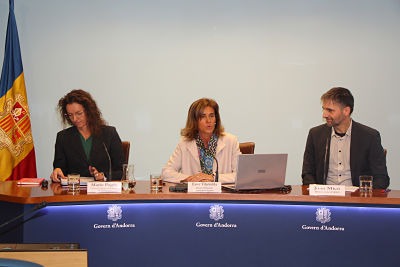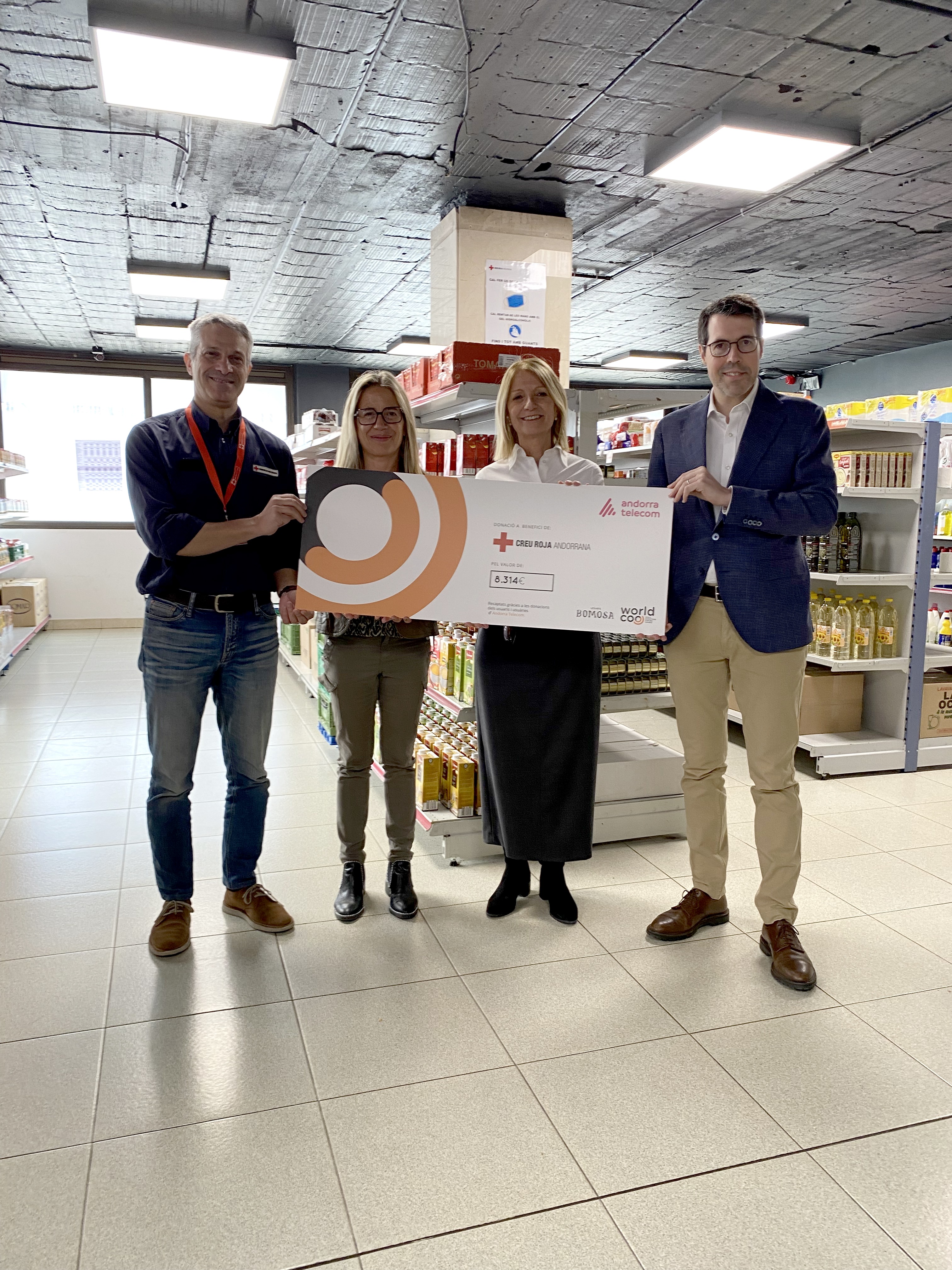
Nov28
#education#anti-bullying
Thursday 28 de November de 2019
The anti-bullying app B-Resol has reached six schools and 2,000 schoolchildren
This tool allows reports of bullying to be made anonymously
A total of 2,000 schoolchildren can access the B-Resol telephone app, which allows them to report cases of bullying anonymously. This has been announced by the director of the Department of Educational Inspection and Quality, Marie Pagés, in a press conference led by the Minister for Higher Education and Teaching, Ester Vilarrubia. The B-Resol app was promoted by the Government with the collaboration of Andorra Telecom.
There are currently six schools using the tool following the inclusion of the Ordino Andorran Secondary School. According to Marie Pagés, as well as providing a means of reporting bullying, the aim of this channel is to "encourage dialogue and mediation, and so to help to resolve conflicts". Maria Pagés has provided data on usage of the app: "There were a total of 173 clicks, of which 19% were invalid (for testing purposes only), 9.3% were fake, 41% stemmed from coexistence issues, 26% from minor incidents and 4.6% serious incidents".
The main purpose of this press conference was to present the results from the school coexistence survey, in which more than 7,000 schoolchildren took part. The Minister of Education informed the public this Thursday that "Bullying in schools has diminished even though the number of reported incidents has actually increased". For her part, Marie Pagés, the director of the Department of Educational Inspection and Quality, pointed out that "given the new channels at our disposal, those affected by bullying were less afraid of making reports". The survey was carried out by the Centre for Sociological Research (Centre de Recerca i Estudis Sociològocs (CRES).
The Education Minister provided a wide-ranging explanation for the initial results obtained from the school bullying prevention plan. Villarubia said that "failure to report doesn't mean there is no bullying, but we’re not going to rest until we’ve managed to stamp it out". Villarubia then handed over to Marie Pagés, who presented an overall analysis of the issues arising from school bullying, and who asserted that "coexistence between schoolchildren must be reinforced, and tools provided so that children can address any issues through mediation". Pagés added that, "raising awareness and providing information must continue, so that we can reduce the number of cases of bullying".
She said that "although a comparison between 2012 and 2019 shows an increase in the number of reports made; it should be noted at the same time that the number of incidents of bullying has fallen". During the school year 2012-2013 two incidents of bullying were recorded. On the other hand, during the school year 2018-2019 twelve were recorded. Pagés explains this by arguing that "although there may be more cases, this increase has taken place because the number of channels for reporting bullying has increased, and today there is a far greater guarantee of anonymity".
The Government itself has provided information on different types of bullying: verbal, social, physical and cyber. Data recorded for the 2016-17 school year indicates, according to Pagés, that "out of fourteen cases during this period, five were for verbal and social bullying, and four for cyber bullying". Regarding these fourteen cases, Marie Pagés has stated that "three took place in primary education and eleven in secondary education".
The evolution of this data with regard to the 2017-18 school year means that "the number of incidents has remained the same, although more different types of incident have been reported", Pagés stated. Regarding the fourteen cases reported during the 2017-18 school year, four involved verbal bullying, three both verbal and physical bullying , two physical bullying, two both verbal and physical bullying, and three cyber bullying. As in the previous school year, three of these incidents took place in primary education and eleven in secondary. Over the 2018-19 school year, the most recent year studied, there were twelve bullying incidents, six involving verbal bullying, three verbal and social bullying, one involving both physical and verbal bullying and two cyber bullying. They all took place in secondary education.
The director of the Department of Educational Inspection and Quality, explained that, "regarding gender, it must be noted that girls have reported more incidents of bullying than boys". Pagés provided more specific information: "During the 2016-17 school year, four reports were made by boys, and two by girls, the same as during the 2017-18 school year. But during the 2018-19 school year, the number of incidents has decreased, with two reports made by boys and two by girls".
There are currently six schools using the tool following the inclusion of the Ordino Andorran Secondary School. According to Marie Pagés, as well as providing a means of reporting bullying, the aim of this channel is to "encourage dialogue and mediation, and so to help to resolve conflicts". Maria Pagés has provided data on usage of the app: "There were a total of 173 clicks, of which 19% were invalid (for testing purposes only), 9.3% were fake, 41% stemmed from coexistence issues, 26% from minor incidents and 4.6% serious incidents".
The main purpose of this press conference was to present the results from the school coexistence survey, in which more than 7,000 schoolchildren took part. The Minister of Education informed the public this Thursday that "Bullying in schools has diminished even though the number of reported incidents has actually increased". For her part, Marie Pagés, the director of the Department of Educational Inspection and Quality, pointed out that "given the new channels at our disposal, those affected by bullying were less afraid of making reports". The survey was carried out by the Centre for Sociological Research (Centre de Recerca i Estudis Sociològocs (CRES).
The Education Minister provided a wide-ranging explanation for the initial results obtained from the school bullying prevention plan. Villarubia said that "failure to report doesn't mean there is no bullying, but we’re not going to rest until we’ve managed to stamp it out". Villarubia then handed over to Marie Pagés, who presented an overall analysis of the issues arising from school bullying, and who asserted that "coexistence between schoolchildren must be reinforced, and tools provided so that children can address any issues through mediation". Pagés added that, "raising awareness and providing information must continue, so that we can reduce the number of cases of bullying".
She said that "although a comparison between 2012 and 2019 shows an increase in the number of reports made; it should be noted at the same time that the number of incidents of bullying has fallen". During the school year 2012-2013 two incidents of bullying were recorded. On the other hand, during the school year 2018-2019 twelve were recorded. Pagés explains this by arguing that "although there may be more cases, this increase has taken place because the number of channels for reporting bullying has increased, and today there is a far greater guarantee of anonymity".
The Government itself has provided information on different types of bullying: verbal, social, physical and cyber. Data recorded for the 2016-17 school year indicates, according to Pagés, that "out of fourteen cases during this period, five were for verbal and social bullying, and four for cyber bullying". Regarding these fourteen cases, Marie Pagés has stated that "three took place in primary education and eleven in secondary education".
The evolution of this data with regard to the 2017-18 school year means that "the number of incidents has remained the same, although more different types of incident have been reported", Pagés stated. Regarding the fourteen cases reported during the 2017-18 school year, four involved verbal bullying, three both verbal and physical bullying , two physical bullying, two both verbal and physical bullying, and three cyber bullying. As in the previous school year, three of these incidents took place in primary education and eleven in secondary. Over the 2018-19 school year, the most recent year studied, there were twelve bullying incidents, six involving verbal bullying, three verbal and social bullying, one involving both physical and verbal bullying and two cyber bullying. They all took place in secondary education.
The director of the Department of Educational Inspection and Quality, explained that, "regarding gender, it must be noted that girls have reported more incidents of bullying than boys". Pagés provided more specific information: "During the 2016-17 school year, four reports were made by boys, and two by girls, the same as during the 2017-18 school year. But during the 2018-19 school year, the number of incidents has decreased, with two reports made by boys and two by girls".
Featured articles
Categories
Archive


